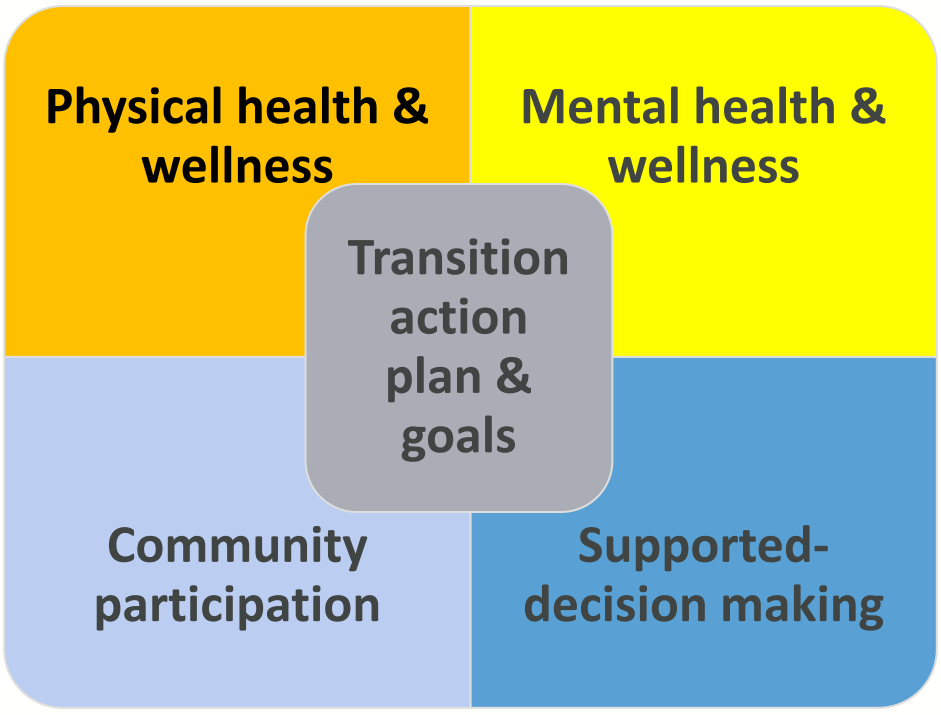Lifespan Transition Clinic
Health Care Transition
Health care transition is the process of moving from a pediatric system of health care to an adult system of health care. It is often a complex and confusing process for families, especially for those who experience disability. Some areas of focus:
- Providing the tools to help identify adult primary care providers and specialists
- Maintaining or updating health insurance
- Learning self-management skills (i.e. making appointments or ordering medication)
- Making medical decisions independently or with support
- Addressing mental health concerns
- Understanding sexual health and relationships
Maintaining quality health care services is an important part of participation in everyday life activities. Healthy adults participate in:
- Vocation/jobs/volunteer work
- Secondary education (college, community college, or technical school)
- Leisure activities (i.e. community groups, sports)
- Exercise
- Religious or spiritual activities
Transition to Adulthood Council (TAC)
We have a youth advisory group made up of individuals with disabilities aged 18–26.
Learn more about the Transition to Adulthood Council (TAC).
Lifespan Transition Clinic
The UCEDD helps support the Lifespan Transition Clinic at the Institute on Development & Disability. This clinic is designed for transition-aged youth age 14-24. We work with patients who experience many different disabilities including Autism Spectrum Disorder, Cerebral Palsy, Intellectual Disability, and Neurocognitive disabilities related to cancer treatments. We also work with youth who experience mental health conditions.
The goal of the LTC is to help youth and their families identify the things that are important to them as they move to adult-based services. We assist the youth and their families in making decisions of what supports and resources can be available to them as they become adults.

Occupational Therapy
Occupational therapists provide evaluations that determine what daily activities are most important to you right now and in the future. We help identify supports and barriers to meeting your daily occupations. This could include self-care activities, managing your home and medical care, participating in school or a job, community activities and leisure.
Social work
Social workers provide comprehensive mental health assessments, helping you identify supports for your emotional health. Mental health plays a very important role in transition to adulthood. Our social work team can help provide resources to support your goals for transition.
Occupational Therapy:
- Occupational Performance evaluation: OT will use a modified interview to determine how the youth or young adult is participating in everyday activities such as self-care, money management, daily chores, health management, school, work, and leisure. We will help you determine which goals would be important to address.
- PEDI-PRO: OT may also use The Pediatric Evaluation of Disability Inventory-Patient Reported Outcomes, or “The PEDI-PRO.” The PEDI-PRO is a patient-reported outcome measure designed for transition-aged youth, ages 14-22, with intellectual and developmental disabilities. A patient-reported outcome measure allows the client to identify their desired outcomes from health and rehabilitation services.
About the PEDI-PRO:
Learn more about the PEDI-PRO.
- “How do I find adult medical providers?”
- “Talking to my doctor about healthcare”
- “Learning how to manage my money”
- “Finding a job”
- “Learning about Supported-Decision making”
- “Understanding how to keep myself safe”
Resources
National Resource Center for Supported Decision-Making
ACLU Supported Decision-Making Resource Library
Center for Transition to Adult Health Care for Youth with Disabilities
OHSU IDD Transitioning to adult health care: Guide for teens and families
MHDD Webinar - Addressing Mental Health in Youth with Intellectual and Developmental Disabilities during Transition to Adulthood - We describe our methods, provide real-life experience with mental health concerns during transition years, and discuss access to needed services.
Transition to Adulthood Town Hall 2019 event - video recording
Resources for occupational therapists
Research
Current and previous projects
Retrospective chart review:
This retrospective chart review of the Lifespan Transition Clinic project involves a review of the families who have attended visits in our clinic. We are not collecting identifying information (no name, date or birth, or location). We are analyzing information from the visits to determine any trends that can inform our future visits in this clinic.
WITH Foundation grant consulting:
The Lifespan Transition Clinic plans to test the Patient Decision Aids for Supported-Decision making created by the UCEDD and Community Vision as part of the WITH Foundation Grant: “Speak My Language! Using Visual Symbols for Supported Decision Making by People Who Use AAC.” Patients and families in the clinic will provide feedback on use, effectiveness, and satisfaction of the symbols.
Utilization of Mental Health Services in the Lifespan Transition Clinic - A Family Perspective:
Our LEND Trainee in Social Work, completed interviews with youth and family who attended a clinic visit. This project focuses on access to mental health care services for transition-aged youth.
Referrals
A referral should come from your primary care doctor or other specialty care professional (needs to be an MD, NP, PA, or licensed psychologist).
Please fax referral to:
(503) 346-0645
Scheduling questions:
(503) 418-0290
Questions about the clinic model:
(503) 494-8315
Family feedback
Parent felt that “the clinic was helpful to their son because it provided their son an outside perspective on the topic of transition.” His parents “had a hard time prior to the clinic of engaging their son to be motivated to engage in transition-related tasks, but this clinic gave their son some perspective to begin.”
Parent stated that "the resources were very helpful, especially the parent support group.” She felt that the clinic was “very helpful and answered all her questions, felt supported, and heard.”